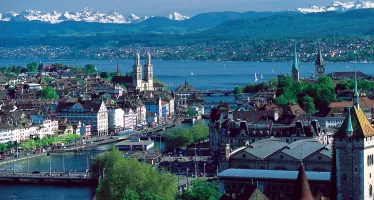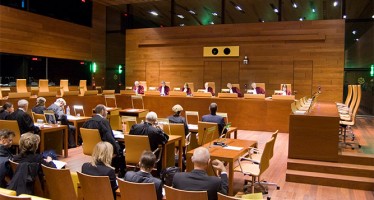Ross Jackson: Stemming the Flow of Refugees – An Holistic Approach
 The unprecedented surge of refugees streaming into Europe is no doubt due to the ongoing wars in Syria and Iraq and the unstable situation in Libya. However, refugees were arriving in Europe long before these wars began. They will continue to do so, even when civil strife has come to an end.
The unprecedented surge of refugees streaming into Europe is no doubt due to the ongoing wars in Syria and Iraq and the unstable situation in Libya. However, refugees were arriving in Europe long before these wars began. They will continue to do so, even when civil strife has come to an end.
The wars distract our attention from the fundamental causes that underlie the long-term migration pattern from Africa to Europe. This trend is partly driven by climate change. Africa will continue to be hit hard by droughts while the continent must also suffer the hypocritical policies Western powers have followed over the past seventy or so years, and continue to follow to this day. The major instruments of that policy are the WTO (World Trade Organisation), IMF (International Monetary Fund), and the World Bank.
I call the policies hypocritical, because – in spite of all the claims made to the contrary on festive occasions – the developing countries’ role in the Orwellian world of neoliberalism is to remain undeveloped. Their role is merely to provide the West with cheap raw materials. They are allowed to compete with each other on who can best satisfy our needs at the lowest cost. However, they must not dream of building up value-added production chain for that privilege is reserved for Western powers only.
“The unprecedented surge of refugees streaming into Europe is no doubt due to the ongoing wars in Syria and Iraq and the unstable situation in Libya. However, refugees were arriving in Europe long before these wars began. They will continue to do so, even when civil strife has come to an end.”
The last thing the West wants to see is competition from developing countries. Thus the WTO, for example, adopts a rule that says no member country may give any advantage to a domestic producer that is not also given to a foreign company. This is the key rule that prevents developing countries from following the path that every industrialised nation, without exception, has followed: from Great Britain in the 18th century to China more recently. All have provided protection to domestic producers from more efficient foreign competitors and have done so until a more level playing field was established.
This is fine for the multinational corporations that wrote this rule into the WTO in 1994 and the 0.1% wealthiest citizens who control them. It is a disaster for developing countries, not least in Africa where a growing population clamours for jobs.
The World Bank has done its part by saddling the people of the developing countries with loans that can never be repaid. These loans were often extended to corrupt leaders, interested only in personal power and gain. Other credits have been awarded for large infrastructure works such as ports, roads, and railways that unlock the mineral resources on which the West is dependent.
Almost none of these investments trickle down to people in the rural communities who suffer in poverty while Western billionaires reap the rewards. These poor folk had no say in the awarding of these loans, which in most cases may be labelled “odious” in the sense that they have been adopted in a conspiracy between corrupt local leaders and willing Western banks without the acceptance of the people.
There is no doubt that for decades, the net flow of cash has been from the developing countries to the industrialised countries. For example, the US Treasury has openly admitted that for every $1 contributed to the World Bank, more than $2 arrives back to US exporters via procurement contracts.
The 2014 State of Finance for Developing Countries report published by the European Network on Debt and Development (Eurodad), concluded that developing nations are losing – through illegal activities, debt, lost profits, and loans – twice as much as they gain through aid, investment, charitable donations, and remittances.
The World Bank’s strategy was spelled out clearly in John Perkin’s book Confessions of an Economic Hit Man. Mr Perkins was a project leader at a major US engineering firm (MAIN) working on World Bank projects. He writes that his bosses explained to him directly that his job was “to bankrupt the countries that received loans so that they would be forever beholden to their creditors, and so they would present easy targets when favours are needed, including military bases, UN votes, or access to oil and other natural resources.”
Then there is the IMF, which completes the picture of developing country exploitation with its structural adjustment policies designed to accomplish the same ends as the World Bank and WTO. In order to get loans the IMF has in numerous cases insisted on the developing countries doing the following:
- Lowering tariffs on Western industrial products
- Depreciating their currency
- Waiving all rights to capital controls, thus exposing the currency to speculators
- Privatising public monopolies.
- Raising interest rates, causing unemployment
- Removing food and educational subsidies to the poor
- Accepting the right of Western countries to dump their excess food products on their markets
- Charging fees to school children
- Cutting welfare programmes
- Repaying debts to the IMF as first priority
- Switching from import substitution to exporting raw materials
Of these policies, Joseph Stiglitz – former chief economist at the World Bank – said that the IMF’s forced contraction of these developing economies would have John Maynard Keynes “rolling over in his grave.” Mr Stiglitz has also called neoliberal economics “more religion than economics.”
The West has created a situation whereby the people of poor countries have no chance of ever developing viable economies—not even when they enjoy a clear comparative advantage such as West African cotton. The US places tariffs on cotton imports from West Africa and even higher tariffs on value-added products like textiles. At the same time, the US government gives substantial subsidies to cotton farmers in the southern states who cannot compete otherwise. Nor will Europe allow African countries to export their very competitive agricultural products. Instead, subsidies are given to European farmers and excess produce is dumped on the developing countries, destroying local markets.
The bottom line is that the surge of migrants is a direct blowback of our own policies over several decades. If we are ever to reverse the flow, we must change our attitudes toward the developing countries. We must help the rural people there to build viable local communities and encourage them to form and run their own businesses with value-added production that they can export to the EU and the USA. We also must begin to see them as extended family rather than competitors. Moreover, we must accept that we cannot continue expanding our Western economic growth on a planet with finite resources. Quite to the contrary, we should rather use future productivity increases to cut working hours, and give Western citizens a better quality of life.
Further material growth in the West can only be achieved at the cost of less material growth in the developing countries and a corresponding increase in migration to Europe. The chickens have come home to roost and it is time we acknowledged our past mistakes.
An example of what is needed to reverse the flow of migrants is the type of project now being promoted by Gaia Education, a Gaia Trust project on whose board I sit. Our goal is to build the capacity of migrants in refugee camps. We do so by teaching and demonstrating the fundamental design principles of sustainable communities from a holistic point of view. This includes economical, ecological, social, and cultural dimensions, so that the migrants can get useful work in Europe as teachers of these same principles or as organic farm workers or entrepreneurs. They may also elect to return to their countries of origin where they can begin to rebuild local communities based on sustainable principles and engaged entrepreneurship.
If we want to be serious about solving the refugee problem over the long-term, we must reverse the “no development” policies of the WTO, IMF, and World Bank, reverse the tariff policies of the EU and USA, and accept that we must make a real effort to help the developing countries to build viable economies that can compete with us. This is the only realistic and just solution to the refugee problem.
About the Author
Ross Jackson, PhD, worked for 25 years in the foreign exchange world as currency adviser to international corpora-tions, currency fund manager, and research head of a team of mathematicians and IT experts. He is author of Occupy World Street: A Roadmap for Radical Economic and Political Reform (Chelsea Green, 2012).
You may have an interest in also reading…
The Swiss Never Miss When it Comes to Perfecting Trade Finance Solutions
Over three decades of experience in developing solutions for the trade finance community. MIT Make Intuitive Tech SA (MITech) is
The Great ‘Ex-Retire Hire’: Over-50s Plugging Labour Shortages
Guy Garnett explores the fascinating return of retirees to the workforce, driven by labour shortages and economic pressures. A Surprising
European Court of Justice: Looking for the Digital Utopia
In a textbook case of be-careful-what-you-wish-for, frustrated lobbyists plying their trade in Brussels on behalf of Google, Microsoft, and other


















































































